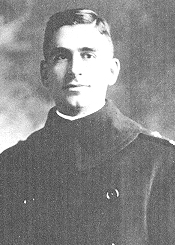Edouard Izac
| Edouard Victor Michel Izac | |
|---|---|

Edouard Izac (U.S. Naval Academy photo)
|
|
| Born |
December 18, 1891 Cresco, Iowa |
| Died | January 18, 1990 (aged 98) Fairfax, Virginia |
| Place of burial | Arlington National Cemetery |
| Allegiance |
|
| Service/branch |
|
| Years of service | 1915–1921 |
| Rank | Lieutenant Commander |
| Battles/wars | World War I |
| Awards | |
| Other work | U.S. Representative from California |
Edouard Victor Michel Izac (Cresco, Iowa, December 18, 1891 – January 18, 1990) was a lieutenant in the United States Navy during World War I, a Representative from California and a Medal of Honor recipient.
He was born with the last name of Isaacs, the youngest of nine children, in Cresco, Howard County, Iowa, to Balthazar (born in Alsace-Lorraine) and Mathilda Geuth (born in Philadelphia, with the family heritage from Baden-Württemberg).
Izac attended the School of the Assumption, Cresco, Iowa, the high school at South St. Paul, Minnesota, and Werntz Preparatory School, Annapolis, Maryland. He graduated from the United States Naval Academy in 1915. The day following his graduation from the academy he married Agnes Cabell (died 1975), daughter of General De Rosey Carroll Cabell.
He first served on the battleship USS Florida (BB-30), then after he was promoted from ensign to lieutenant (junior grade), he signed up for the Naval Transport Service. During this time, his daughter Cabell was born in 1916. He transferred to the troop transport USS President Lincoln in July 1917. From her maiden voyage in the U.S. Navy, October 18, 1917, she made five successful trips to Europe and back.
On May 31, 1918, President Lincoln sank after being struck by three torpedoes from the German submarine U–90. Izac was taken aboard the U–90 as a prisoner of war. Learning valuable information about enemy submarine movements on the trip to Germany, he tried to escape several times. On one attempt, he was injured after jumping through the window of a moving train. He finally succeeded in escaping, with several others, from a German prison camp on the night of October 6–7. He and Sub-Lieutenant Willis reached neutral Switzerland on October 13. Upon reaching London, he passed on his information to Admiral Sims; by that time, however, the war was nearly over, and Sims showed little interest. Nevertheless, for his actions, he was awarded the Medal of Honor in November 1920.
...
Wikipedia
